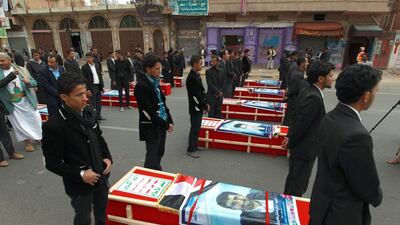SANAA // With the world’s attention focused on the fight against ISIL, something huge happened in Yemen.
Capping a string of battlefield victories against their Sunni foes, the Houthi Shiite rebels swept into the capital Sanaa last month, capturing the capital city of a nation long mired in violence and political upheavals.
Suspected of links to Lebanon’s Iranian-backed Hizbollah, the Houthi rebels fanned across the city of three million, taking over key state installations, including overall responsibility for security at the city’s international airport as well as the central bank and the defence ministry.
On Tuesday, they staged another stunning blitz, capturing the port city of Hodeidah on the Red Sea as well as the province of Damar south of the capital, lending credence to suspicions that the rebels intended to set up a mini-state in Yemen, taking advantage of the turmoil sweeping the poor nation.
When the Houthis took full control of Sanaa on September 21, what had for years been a problem hidden away in the mountains north of Sanaa, where the Houthis and government troops battled six wars between 2004 and 2010, became a crisis visible to all in the capital.
The Houthis manned checkpoints across the city and cruised the streets in pickup trucks fitted with anti-aircraft guns. The city’s military bases were looted, including the depots of the elite 1st Armoured Division, and revenge attacks and house raids continued for days, targeting the homes and offices of the Houthis’ sworn enemies: leaders of the Islamist Islah Party.
As the city fell, representatives of the Houthis, Islah and other political factions signed off on a new political accord to secure the nation’s future and spare it further bloodshed and turmoil, but it hardly compensated for what was in effect the collapse of more than two years of transition from the authoritarian, 33-year rule of former president Ali Abdullah Saleh to democracy.
The armed Houthis have maintained a stranglehold on the city, crushing hopes among frustrated residents that they would leave.
Yemen's new power brokers were quick to flex their muscles in the capital, forcing the president, Abed Rabbou Mansour Hadi, to drop last week his first choice of a new prime minister, Ahmed Awad bin Mubarak. On Monday, Mr Hadi picked up another one, career diplomat Khaled Bahah.
Regionally, the Houthi takeover of the capital has given Iran a foothold in a strategic part of the Arabian Peninsula. Just as importantly, the takeover is likely to open a new Shiite-Sunni front line in the region, raising fears of the bloodshed of Iraq and Syria.
Already, Al Qaeda, whose branch in Yemen is viewed by the United States as the world’s most dangerous, has threatened to retaliate and called on Sunnis to rise up and fight the Houthis. Last Thursday, the terror network claimed responsibility for a suicide attack that targeted a rally by Houthis angry over Mr Hadi’s choice of a new prime minister. A total of 51 were killed and more than 70 injured.
The prospect of a sectarian war and the control of the capital by what is in effect a Shiite militia have pushed Yemen closer to being a failed state. Yemen, however, has not looked like a functioning nation-state for years, with the central government’s authority weak in Sanaa and nearly non-existent outside it. Poverty in rural Yemen and the lack of essential services have for years fed resentment and, in some cases, led to outright rebellions.
A years-long US campaign to use drones to strike at Al Qaeda militants, their hideouts and camps across much of Yemen has fed instability and deepened resentment of the central government, which has offered the Americans unprecedented facilities in their fight against the militants since Mr Hadi took office in 2012.
The Houthi takeover of Sanaa, moreover, has dealt a body blow to the military, which is one of the pillars of the Yemeni state.
Many of the thousands of military personnel in Sanaa melted away as the Houthis approached the city and the looting of their hardware and weapons has demoralised the troops. Much of the weapons captured by the Houthis are now in their strongholds in the northern provinces of Saada and Omran, giving them significantly more firepower.
Without a strong military under the control of central government, Yemen appears helpless in the face of formidable forces pulling it apart, from a growing secessionist movement in the south and an increasingly emboldened Al Qaeda to power-hungry Houthi rebels who seem unstoppable.
foreign.desk@thenational.ae

